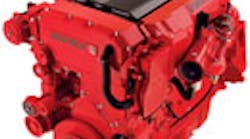Cummins announced today it will add Selective Catalytic Reduction (SCR) aftertreatment to its heavy-duty product line to meet 2010 Environmental Protection Agency (EPA) diesel-engine emissions regulations.
The company said recent advancements in catalyst technology, specifically its use of copper zeolite, will allow its 2010 engines to achieve up to a 5% improvement in fuel economy while meeting the EPA regulations.
According to Steve Charlton, vp of heavy-duty engineering for Cummins, copper zeolite has been around for a long time, but wasn’t in research labs until two or three years ago and only became available for automotive applications in the past nine to twelve months. “Copper zeolite is very, very efficient at reducing NOx compared to other catalysts,” noted Charlton.
“Everyone in the industry will be using EGR (Exhaust Gas Recirculation),” Charlton said. “It’s really the combination of EGR and SCR that makes this work, along with the diesel particulate filter…we are running prototype systems right now, and we’re confident that the SCR results we’re expecting can be delivered.”
The Cummins heavy-duty ISX engine family will incorporate the previously announced XPI high-pressure common rail (HPCR) fuel system, the company noted. “We feel like we’re on track for a successful launch of the XPI system on heavy-duty platforms in January of 2010,” Charlton added.
Cummins said that this year’s spike in fuel prices necessitated the move. Cummins vp of sales & marketing Jeff Jones said that if an engine system can deliver even a 1% or 2% increase in fuel economy, it would save a significant amount in diesel. “At $5 a gallon, it’s a whole lot more beneficial to our customers than it would be at $2.50 per gallon,” he said.
“We feel confident that we can leverage most of the work we’ve done on our mid-range vehicles for heavy-duty,” said Ed Pence, vp & gm, heavy-duty engine business for Cummins. “We’ve met with our OEM partners and told them we would be ready to deliver on time. This was too important of a technological discovery for us to overlook.”
The announcement leaves Navistar as the only U.S. engine maker who will not be offering an SCR engine for 2010. Navistar currently does not have any plan to offer an SCR option. “We have our strategy, and we’re sticking to it,” Roy Wiley, Navistar spokesperson, told FleetOwner. “Our engine platform has been thoroughly tested using EGR, and we believe this is the best path for us to take for our customers.”
Related articles:
- SCR or EGR?
- Cummins continuing dual-track approach to 2010 emissions rules
- DEF infrastructure in good shape
View more Fleet Owner equipment news and other commercial trucking-related articles.




